The Impact of Data Analytics on Consulting Process Efficiency
VerifiedAdded on 2020/09/17
|18
|6002
|54
Essay
AI Summary
This essay examines the integration of data analytics within consulting processes, emphasizing its role in enhancing business productivity and profitability. It explores the application of data analytics, the challenges faced by consulting organizations, such as employee retention and cybersecurity, and reviews relevant literature from senior researchers. The essay covers the consulting process, from data collection and analysis to strategy development and performance monitoring. It highlights the importance of data analytics in converting raw data into meaningful insights, aiding in informed decision-making and strategic planning. The study identifies key issues, including data storage, employee skill gaps, and the need for robust cybersecurity measures. The essay concludes by discussing the application of Decision Theory to provide a comprehensive understanding of the subject.
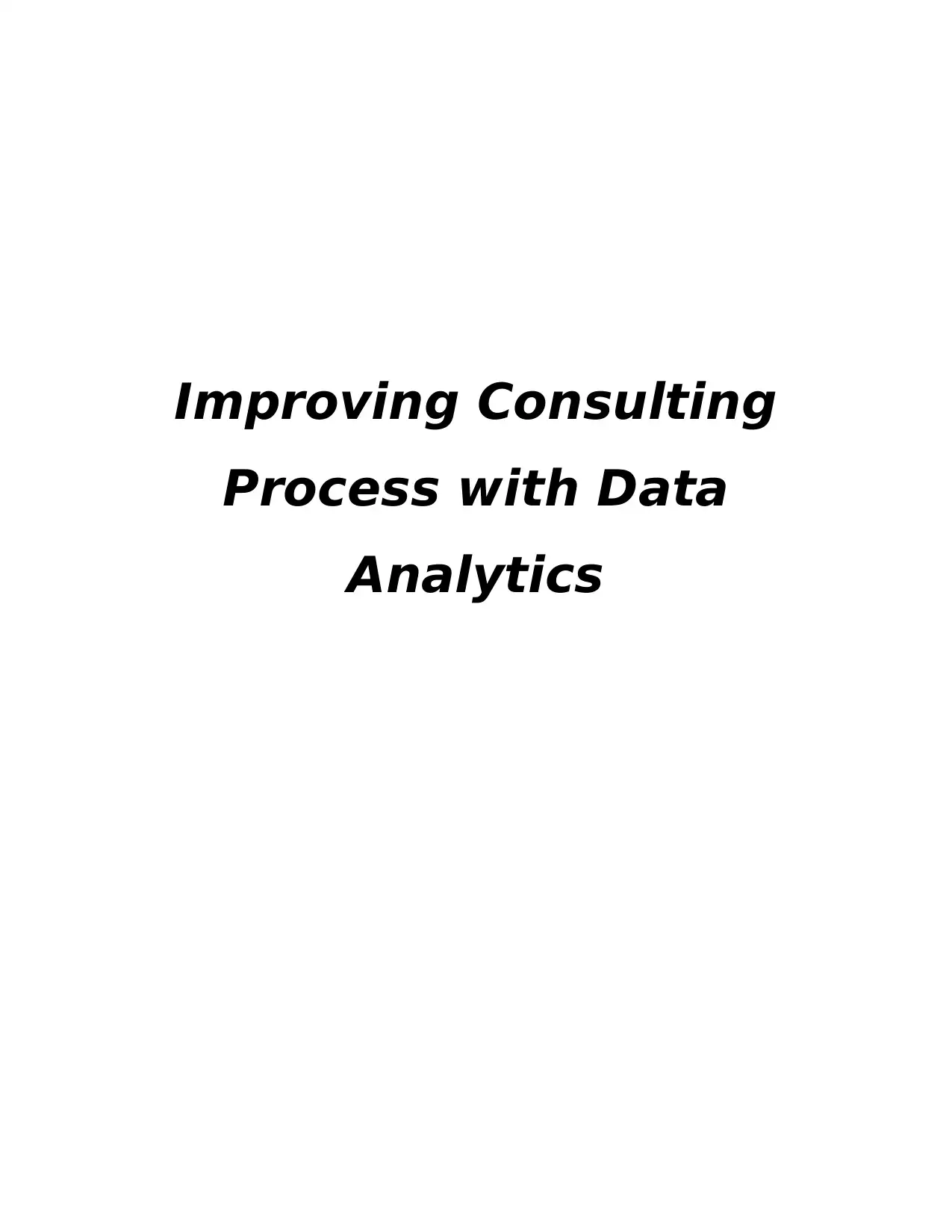
Improving Consulting
Process with Data
Analytics
Process with Data
Analytics
Paraphrase This Document
Need a fresh take? Get an instant paraphrase of this document with our AI Paraphraser
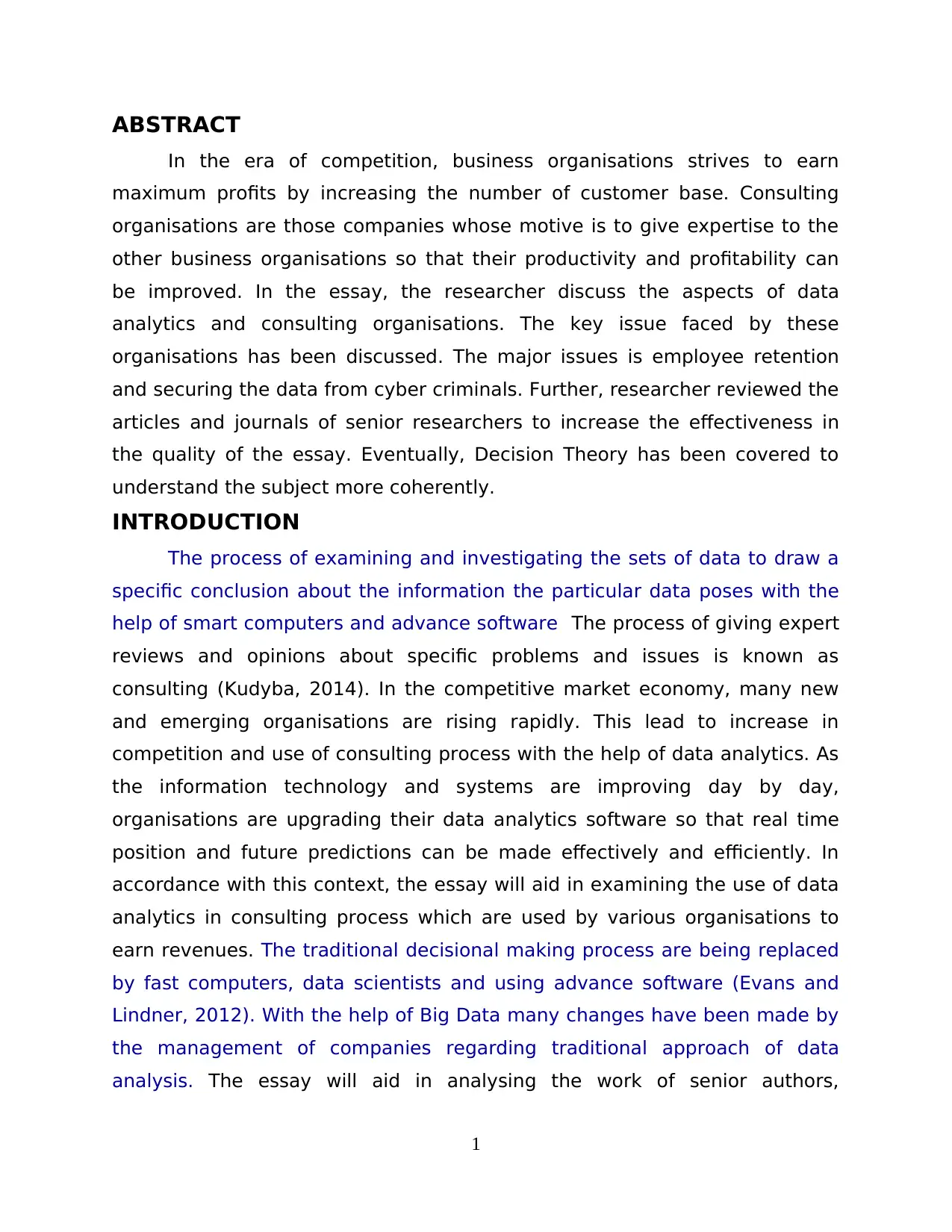
ABSTRACT
In the era of competition, business organisations strives to earn
maximum profits by increasing the number of customer base. Consulting
organisations are those companies whose motive is to give expertise to the
other business organisations so that their productivity and profitability can
be improved. In the essay, the researcher discuss the aspects of data
analytics and consulting organisations. The key issue faced by these
organisations has been discussed. The major issues is employee retention
and securing the data from cyber criminals. Further, researcher reviewed the
articles and journals of senior researchers to increase the effectiveness in
the quality of the essay. Eventually, Decision Theory has been covered to
understand the subject more coherently.
INTRODUCTION
The process of examining and investigating the sets of data to draw a
specific conclusion about the information the particular data poses with the
help of smart computers and advance software The process of giving expert
reviews and opinions about specific problems and issues is known as
consulting (Kudyba, 2014). In the competitive market economy, many new
and emerging organisations are rising rapidly. This lead to increase in
competition and use of consulting process with the help of data analytics. As
the information technology and systems are improving day by day,
organisations are upgrading their data analytics software so that real time
position and future predictions can be made effectively and efficiently. In
accordance with this context, the essay will aid in examining the use of data
analytics in consulting process which are used by various organisations to
earn revenues. The traditional decisional making process are being replaced
by fast computers, data scientists and using advance software (Evans and
Lindner, 2012). With the help of Big Data many changes have been made by
the management of companies regarding traditional approach of data
analysis. The essay will aid in analysing the work of senior authors,
1
In the era of competition, business organisations strives to earn
maximum profits by increasing the number of customer base. Consulting
organisations are those companies whose motive is to give expertise to the
other business organisations so that their productivity and profitability can
be improved. In the essay, the researcher discuss the aspects of data
analytics and consulting organisations. The key issue faced by these
organisations has been discussed. The major issues is employee retention
and securing the data from cyber criminals. Further, researcher reviewed the
articles and journals of senior researchers to increase the effectiveness in
the quality of the essay. Eventually, Decision Theory has been covered to
understand the subject more coherently.
INTRODUCTION
The process of examining and investigating the sets of data to draw a
specific conclusion about the information the particular data poses with the
help of smart computers and advance software The process of giving expert
reviews and opinions about specific problems and issues is known as
consulting (Kudyba, 2014). In the competitive market economy, many new
and emerging organisations are rising rapidly. This lead to increase in
competition and use of consulting process with the help of data analytics. As
the information technology and systems are improving day by day,
organisations are upgrading their data analytics software so that real time
position and future predictions can be made effectively and efficiently. In
accordance with this context, the essay will aid in examining the use of data
analytics in consulting process which are used by various organisations to
earn revenues. The traditional decisional making process are being replaced
by fast computers, data scientists and using advance software (Evans and
Lindner, 2012). With the help of Big Data many changes have been made by
the management of companies regarding traditional approach of data
analysis. The essay will aid in analysing the work of senior authors,
1
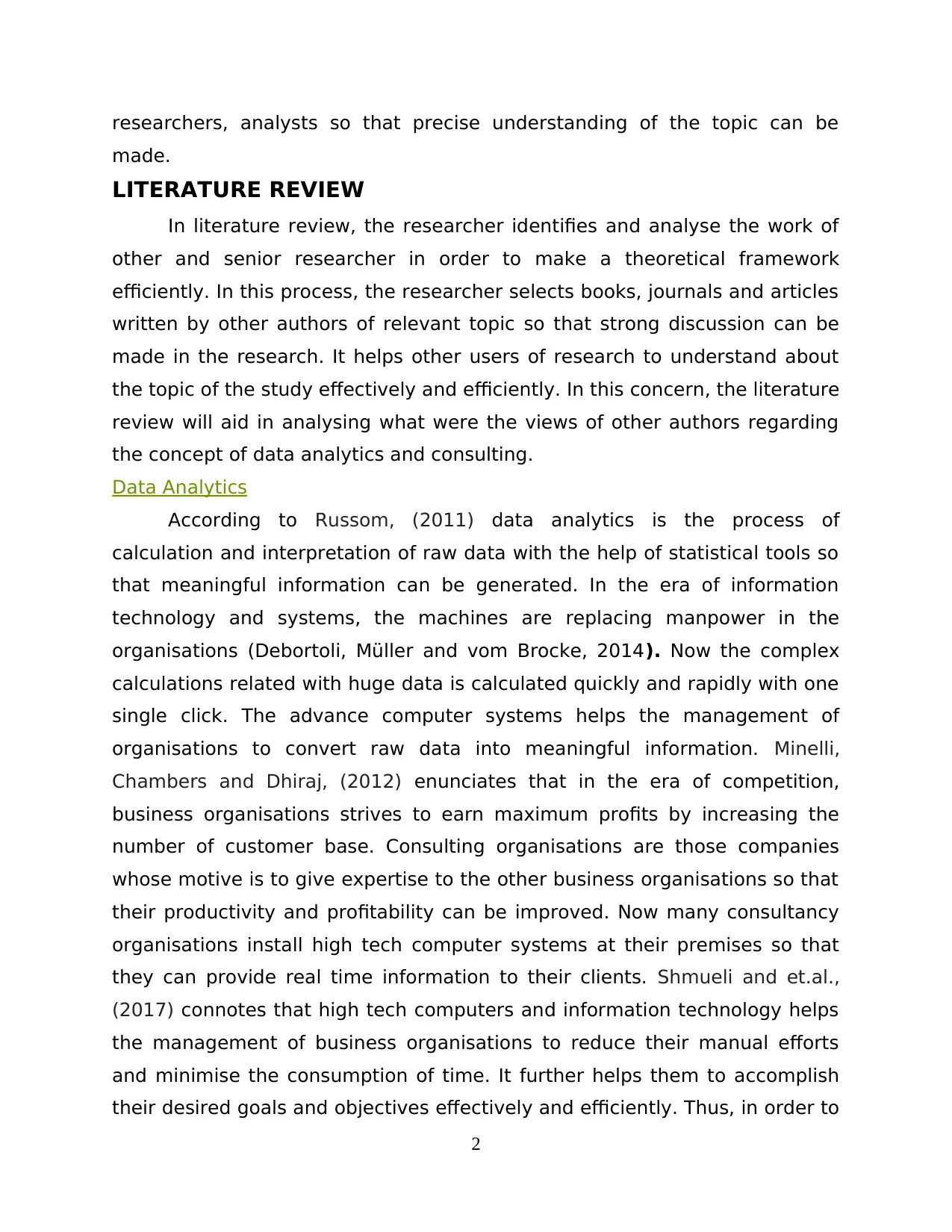
researchers, analysts so that precise understanding of the topic can be
made.
LITERATURE REVIEW
In literature review, the researcher identifies and analyse the work of
other and senior researcher in order to make a theoretical framework
efficiently. In this process, the researcher selects books, journals and articles
written by other authors of relevant topic so that strong discussion can be
made in the research. It helps other users of research to understand about
the topic of the study effectively and efficiently. In this concern, the literature
review will aid in analysing what were the views of other authors regarding
the concept of data analytics and consulting.
Data Analytics
According to Russom, (2011) data analytics is the process of
calculation and interpretation of raw data with the help of statistical tools so
that meaningful information can be generated. In the era of information
technology and systems, the machines are replacing manpower in the
organisations (Debortoli, Müller and vom Brocke, 2014). Now the complex
calculations related with huge data is calculated quickly and rapidly with one
single click. The advance computer systems helps the management of
organisations to convert raw data into meaningful information. Minelli,
Chambers and Dhiraj, (2012) enunciates that in the era of competition,
business organisations strives to earn maximum profits by increasing the
number of customer base. Consulting organisations are those companies
whose motive is to give expertise to the other business organisations so that
their productivity and profitability can be improved. Now many consultancy
organisations install high tech computer systems at their premises so that
they can provide real time information to their clients. Shmueli and et.al.,
(2017) connotes that high tech computers and information technology helps
the management of business organisations to reduce their manual efforts
and minimise the consumption of time. It further helps them to accomplish
their desired goals and objectives effectively and efficiently. Thus, in order to
2
made.
LITERATURE REVIEW
In literature review, the researcher identifies and analyse the work of
other and senior researcher in order to make a theoretical framework
efficiently. In this process, the researcher selects books, journals and articles
written by other authors of relevant topic so that strong discussion can be
made in the research. It helps other users of research to understand about
the topic of the study effectively and efficiently. In this concern, the literature
review will aid in analysing what were the views of other authors regarding
the concept of data analytics and consulting.
Data Analytics
According to Russom, (2011) data analytics is the process of
calculation and interpretation of raw data with the help of statistical tools so
that meaningful information can be generated. In the era of information
technology and systems, the machines are replacing manpower in the
organisations (Debortoli, Müller and vom Brocke, 2014). Now the complex
calculations related with huge data is calculated quickly and rapidly with one
single click. The advance computer systems helps the management of
organisations to convert raw data into meaningful information. Minelli,
Chambers and Dhiraj, (2012) enunciates that in the era of competition,
business organisations strives to earn maximum profits by increasing the
number of customer base. Consulting organisations are those companies
whose motive is to give expertise to the other business organisations so that
their productivity and profitability can be improved. Now many consultancy
organisations install high tech computer systems at their premises so that
they can provide real time information to their clients. Shmueli and et.al.,
(2017) connotes that high tech computers and information technology helps
the management of business organisations to reduce their manual efforts
and minimise the consumption of time. It further helps them to accomplish
their desired goals and objectives effectively and efficiently. Thus, in order to
2
⊘ This is a preview!⊘
Do you want full access?
Subscribe today to unlock all pages.

Trusted by 1+ million students worldwide
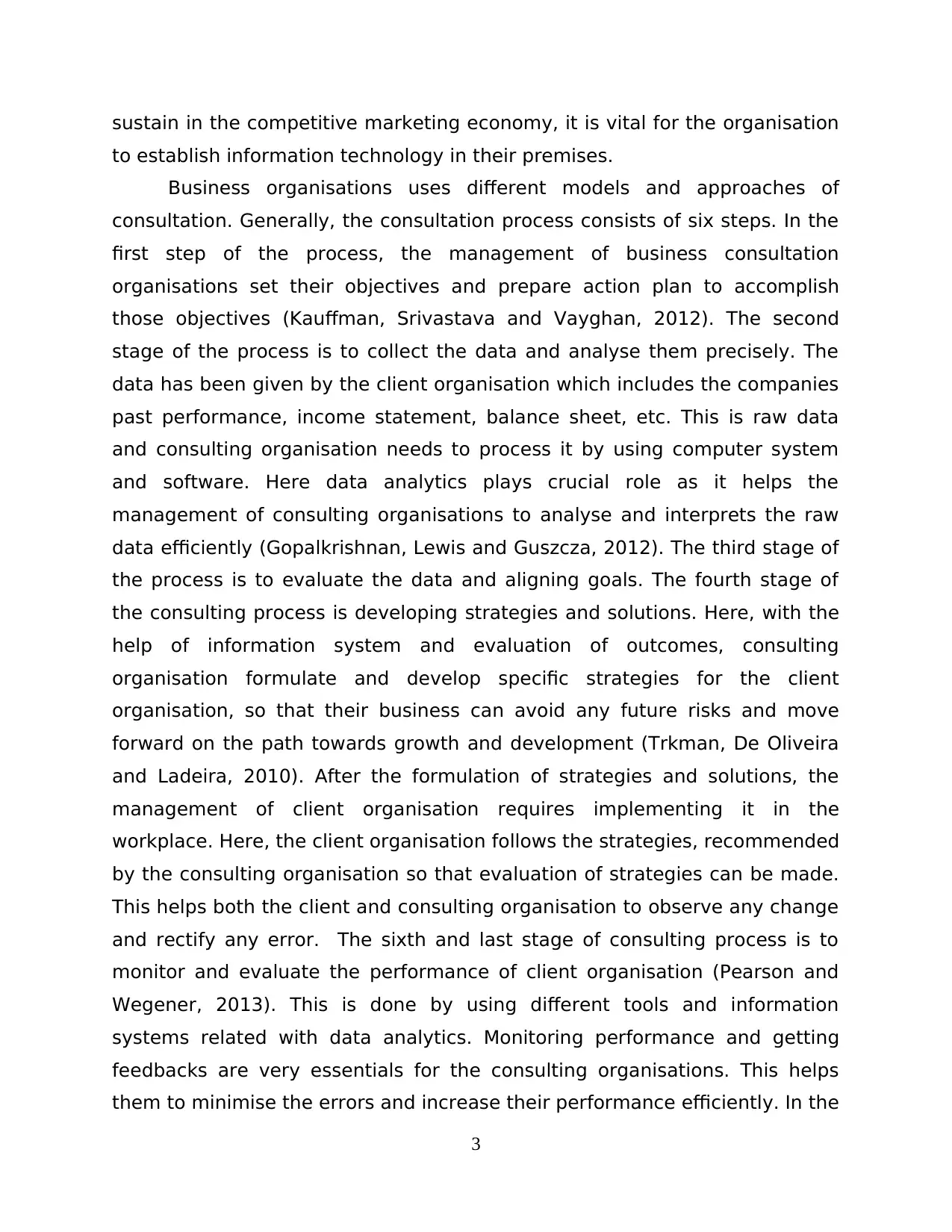
sustain in the competitive marketing economy, it is vital for the organisation
to establish information technology in their premises.
Business organisations uses different models and approaches of
consultation. Generally, the consultation process consists of six steps. In the
first step of the process, the management of business consultation
organisations set their objectives and prepare action plan to accomplish
those objectives (Kauffman, Srivastava and Vayghan, 2012). The second
stage of the process is to collect the data and analyse them precisely. The
data has been given by the client organisation which includes the companies
past performance, income statement, balance sheet, etc. This is raw data
and consulting organisation needs to process it by using computer system
and software. Here data analytics plays crucial role as it helps the
management of consulting organisations to analyse and interprets the raw
data efficiently (Gopalkrishnan, Lewis and Guszcza, 2012). The third stage of
the process is to evaluate the data and aligning goals. The fourth stage of
the consulting process is developing strategies and solutions. Here, with the
help of information system and evaluation of outcomes, consulting
organisation formulate and develop specific strategies for the client
organisation, so that their business can avoid any future risks and move
forward on the path towards growth and development (Trkman, De Oliveira
and Ladeira, 2010). After the formulation of strategies and solutions, the
management of client organisation requires implementing it in the
workplace. Here, the client organisation follows the strategies, recommended
by the consulting organisation so that evaluation of strategies can be made.
This helps both the client and consulting organisation to observe any change
and rectify any error. The sixth and last stage of consulting process is to
monitor and evaluate the performance of client organisation (Pearson and
Wegener, 2013). This is done by using different tools and information
systems related with data analytics. Monitoring performance and getting
feedbacks are very essentials for the consulting organisations. This helps
them to minimise the errors and increase their performance efficiently. In the
3
to establish information technology in their premises.
Business organisations uses different models and approaches of
consultation. Generally, the consultation process consists of six steps. In the
first step of the process, the management of business consultation
organisations set their objectives and prepare action plan to accomplish
those objectives (Kauffman, Srivastava and Vayghan, 2012). The second
stage of the process is to collect the data and analyse them precisely. The
data has been given by the client organisation which includes the companies
past performance, income statement, balance sheet, etc. This is raw data
and consulting organisation needs to process it by using computer system
and software. Here data analytics plays crucial role as it helps the
management of consulting organisations to analyse and interprets the raw
data efficiently (Gopalkrishnan, Lewis and Guszcza, 2012). The third stage of
the process is to evaluate the data and aligning goals. The fourth stage of
the consulting process is developing strategies and solutions. Here, with the
help of information system and evaluation of outcomes, consulting
organisation formulate and develop specific strategies for the client
organisation, so that their business can avoid any future risks and move
forward on the path towards growth and development (Trkman, De Oliveira
and Ladeira, 2010). After the formulation of strategies and solutions, the
management of client organisation requires implementing it in the
workplace. Here, the client organisation follows the strategies, recommended
by the consulting organisation so that evaluation of strategies can be made.
This helps both the client and consulting organisation to observe any change
and rectify any error. The sixth and last stage of consulting process is to
monitor and evaluate the performance of client organisation (Pearson and
Wegener, 2013). This is done by using different tools and information
systems related with data analytics. Monitoring performance and getting
feedbacks are very essentials for the consulting organisations. This helps
them to minimise the errors and increase their performance efficiently. In the
3
Paraphrase This Document
Need a fresh take? Get an instant paraphrase of this document with our AI Paraphraser
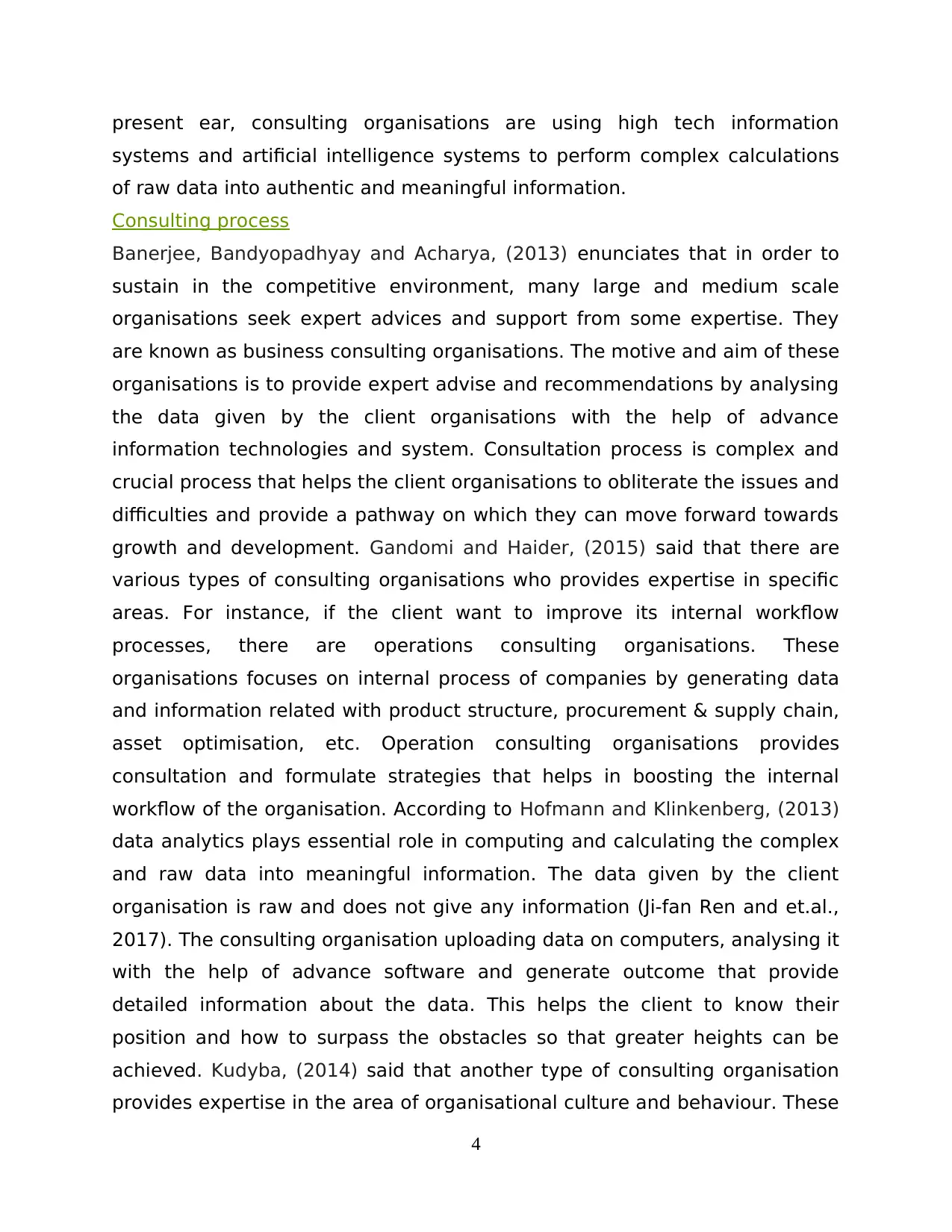
present ear, consulting organisations are using high tech information
systems and artificial intelligence systems to perform complex calculations
of raw data into authentic and meaningful information.
Consulting process
Banerjee, Bandyopadhyay and Acharya, (2013) enunciates that in order to
sustain in the competitive environment, many large and medium scale
organisations seek expert advices and support from some expertise. They
are known as business consulting organisations. The motive and aim of these
organisations is to provide expert advise and recommendations by analysing
the data given by the client organisations with the help of advance
information technologies and system. Consultation process is complex and
crucial process that helps the client organisations to obliterate the issues and
difficulties and provide a pathway on which they can move forward towards
growth and development. Gandomi and Haider, (2015) said that there are
various types of consulting organisations who provides expertise in specific
areas. For instance, if the client want to improve its internal workflow
processes, there are operations consulting organisations. These
organisations focuses on internal process of companies by generating data
and information related with product structure, procurement & supply chain,
asset optimisation, etc. Operation consulting organisations provides
consultation and formulate strategies that helps in boosting the internal
workflow of the organisation. According to Hofmann and Klinkenberg, (2013)
data analytics plays essential role in computing and calculating the complex
and raw data into meaningful information. The data given by the client
organisation is raw and does not give any information (Ji-fan Ren and et.al.,
2017). The consulting organisation uploading data on computers, analysing it
with the help of advance software and generate outcome that provide
detailed information about the data. This helps the client to know their
position and how to surpass the obstacles so that greater heights can be
achieved. Kudyba, (2014) said that another type of consulting organisation
provides expertise in the area of organisational culture and behaviour. These
4
systems and artificial intelligence systems to perform complex calculations
of raw data into authentic and meaningful information.
Consulting process
Banerjee, Bandyopadhyay and Acharya, (2013) enunciates that in order to
sustain in the competitive environment, many large and medium scale
organisations seek expert advices and support from some expertise. They
are known as business consulting organisations. The motive and aim of these
organisations is to provide expert advise and recommendations by analysing
the data given by the client organisations with the help of advance
information technologies and system. Consultation process is complex and
crucial process that helps the client organisations to obliterate the issues and
difficulties and provide a pathway on which they can move forward towards
growth and development. Gandomi and Haider, (2015) said that there are
various types of consulting organisations who provides expertise in specific
areas. For instance, if the client want to improve its internal workflow
processes, there are operations consulting organisations. These
organisations focuses on internal process of companies by generating data
and information related with product structure, procurement & supply chain,
asset optimisation, etc. Operation consulting organisations provides
consultation and formulate strategies that helps in boosting the internal
workflow of the organisation. According to Hofmann and Klinkenberg, (2013)
data analytics plays essential role in computing and calculating the complex
and raw data into meaningful information. The data given by the client
organisation is raw and does not give any information (Ji-fan Ren and et.al.,
2017). The consulting organisation uploading data on computers, analysing it
with the help of advance software and generate outcome that provide
detailed information about the data. This helps the client to know their
position and how to surpass the obstacles so that greater heights can be
achieved. Kudyba, (2014) said that another type of consulting organisation
provides expertise in the area of organisational culture and behaviour. These
4
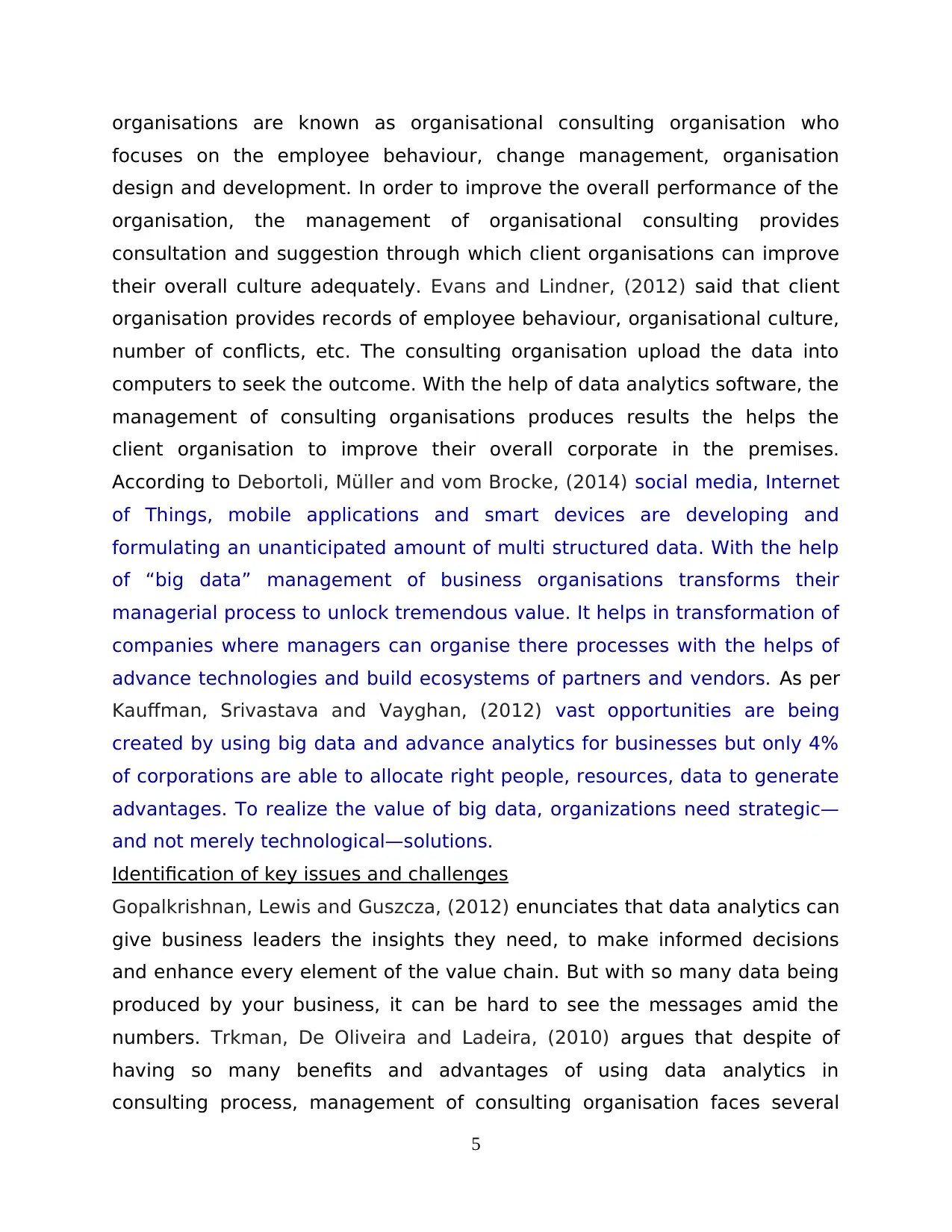
organisations are known as organisational consulting organisation who
focuses on the employee behaviour, change management, organisation
design and development. In order to improve the overall performance of the
organisation, the management of organisational consulting provides
consultation and suggestion through which client organisations can improve
their overall culture adequately. Evans and Lindner, (2012) said that client
organisation provides records of employee behaviour, organisational culture,
number of conflicts, etc. The consulting organisation upload the data into
computers to seek the outcome. With the help of data analytics software, the
management of consulting organisations produces results the helps the
client organisation to improve their overall corporate in the premises.
According to Debortoli, Müller and vom Brocke, (2014) social media, Internet
of Things, mobile applications and smart devices are developing and
formulating an unanticipated amount of multi structured data. With the help
of “big data” management of business organisations transforms their
managerial process to unlock tremendous value. It helps in transformation of
companies where managers can organise there processes with the helps of
advance technologies and build ecosystems of partners and vendors. As per
Kauffman, Srivastava and Vayghan, (2012) vast opportunities are being
created by using big data and advance analytics for businesses but only 4%
of corporations are able to allocate right people, resources, data to generate
advantages. To realize the value of big data, organizations need strategic—
and not merely technological—solutions.
Identification of key issues and challenges
Gopalkrishnan, Lewis and Guszcza, (2012) enunciates that data analytics can
give business leaders the insights they need, to make informed decisions
and enhance every element of the value chain. But with so many data being
produced by your business, it can be hard to see the messages amid the
numbers. Trkman, De Oliveira and Ladeira, (2010) argues that despite of
having so many benefits and advantages of using data analytics in
consulting process, management of consulting organisation faces several
5
focuses on the employee behaviour, change management, organisation
design and development. In order to improve the overall performance of the
organisation, the management of organisational consulting provides
consultation and suggestion through which client organisations can improve
their overall culture adequately. Evans and Lindner, (2012) said that client
organisation provides records of employee behaviour, organisational culture,
number of conflicts, etc. The consulting organisation upload the data into
computers to seek the outcome. With the help of data analytics software, the
management of consulting organisations produces results the helps the
client organisation to improve their overall corporate in the premises.
According to Debortoli, Müller and vom Brocke, (2014) social media, Internet
of Things, mobile applications and smart devices are developing and
formulating an unanticipated amount of multi structured data. With the help
of “big data” management of business organisations transforms their
managerial process to unlock tremendous value. It helps in transformation of
companies where managers can organise there processes with the helps of
advance technologies and build ecosystems of partners and vendors. As per
Kauffman, Srivastava and Vayghan, (2012) vast opportunities are being
created by using big data and advance analytics for businesses but only 4%
of corporations are able to allocate right people, resources, data to generate
advantages. To realize the value of big data, organizations need strategic—
and not merely technological—solutions.
Identification of key issues and challenges
Gopalkrishnan, Lewis and Guszcza, (2012) enunciates that data analytics can
give business leaders the insights they need, to make informed decisions
and enhance every element of the value chain. But with so many data being
produced by your business, it can be hard to see the messages amid the
numbers. Trkman, De Oliveira and Ladeira, (2010) argues that despite of
having so many benefits and advantages of using data analytics in
consulting process, management of consulting organisation faces several
5
⊘ This is a preview!⊘
Do you want full access?
Subscribe today to unlock all pages.

Trusted by 1+ million students worldwide
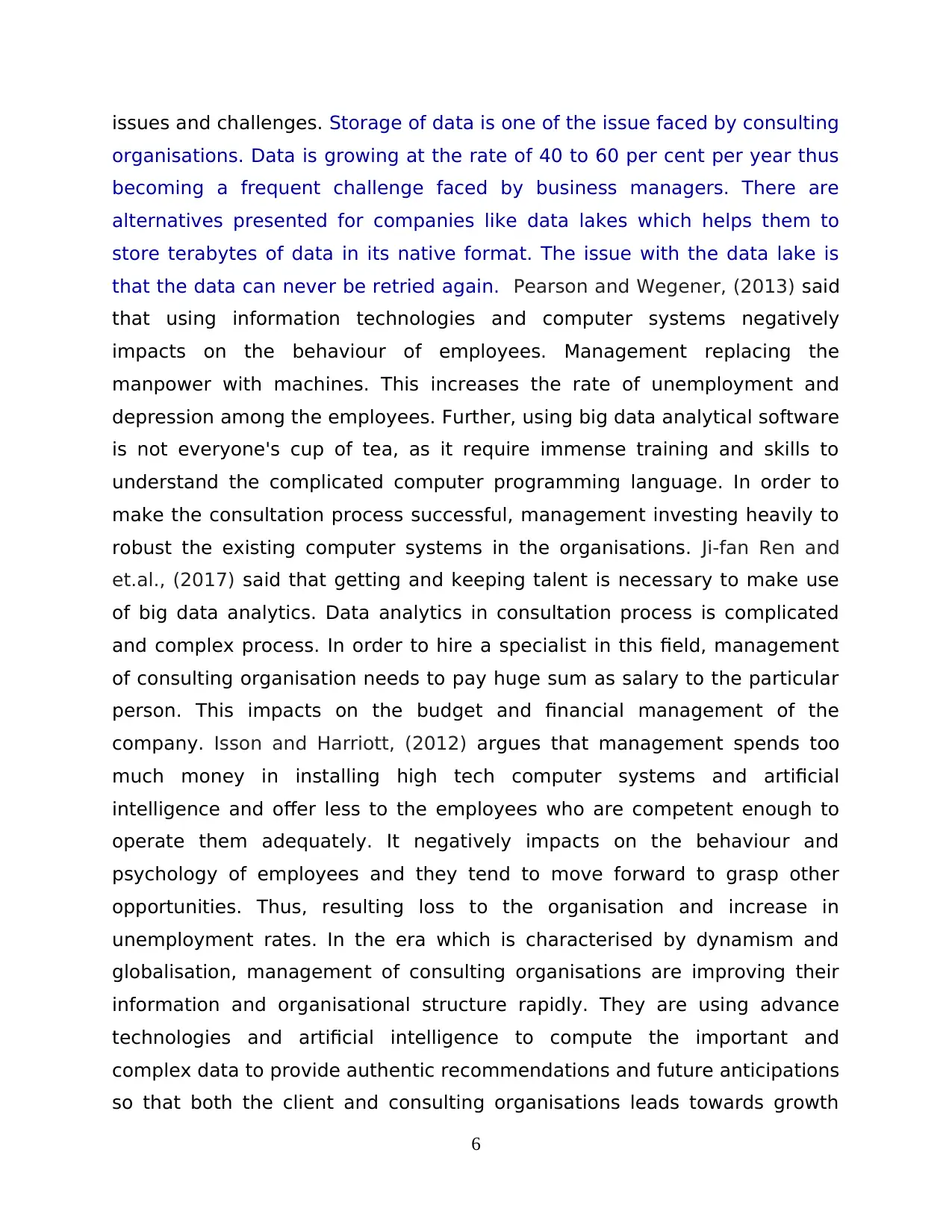
issues and challenges. Storage of data is one of the issue faced by consulting
organisations. Data is growing at the rate of 40 to 60 per cent per year thus
becoming a frequent challenge faced by business managers. There are
alternatives presented for companies like data lakes which helps them to
store terabytes of data in its native format. The issue with the data lake is
that the data can never be retried again. Pearson and Wegener, (2013) said
that using information technologies and computer systems negatively
impacts on the behaviour of employees. Management replacing the
manpower with machines. This increases the rate of unemployment and
depression among the employees. Further, using big data analytical software
is not everyone's cup of tea, as it require immense training and skills to
understand the complicated computer programming language. In order to
make the consultation process successful, management investing heavily to
robust the existing computer systems in the organisations. Ji-fan Ren and
et.al., (2017) said that getting and keeping talent is necessary to make use
of big data analytics. Data analytics in consultation process is complicated
and complex process. In order to hire a specialist in this field, management
of consulting organisation needs to pay huge sum as salary to the particular
person. This impacts on the budget and financial management of the
company. Isson and Harriott, (2012) argues that management spends too
much money in installing high tech computer systems and artificial
intelligence and offer less to the employees who are competent enough to
operate them adequately. It negatively impacts on the behaviour and
psychology of employees and they tend to move forward to grasp other
opportunities. Thus, resulting loss to the organisation and increase in
unemployment rates. In the era which is characterised by dynamism and
globalisation, management of consulting organisations are improving their
information and organisational structure rapidly. They are using advance
technologies and artificial intelligence to compute the important and
complex data to provide authentic recommendations and future anticipations
so that both the client and consulting organisations leads towards growth
6
organisations. Data is growing at the rate of 40 to 60 per cent per year thus
becoming a frequent challenge faced by business managers. There are
alternatives presented for companies like data lakes which helps them to
store terabytes of data in its native format. The issue with the data lake is
that the data can never be retried again. Pearson and Wegener, (2013) said
that using information technologies and computer systems negatively
impacts on the behaviour of employees. Management replacing the
manpower with machines. This increases the rate of unemployment and
depression among the employees. Further, using big data analytical software
is not everyone's cup of tea, as it require immense training and skills to
understand the complicated computer programming language. In order to
make the consultation process successful, management investing heavily to
robust the existing computer systems in the organisations. Ji-fan Ren and
et.al., (2017) said that getting and keeping talent is necessary to make use
of big data analytics. Data analytics in consultation process is complicated
and complex process. In order to hire a specialist in this field, management
of consulting organisation needs to pay huge sum as salary to the particular
person. This impacts on the budget and financial management of the
company. Isson and Harriott, (2012) argues that management spends too
much money in installing high tech computer systems and artificial
intelligence and offer less to the employees who are competent enough to
operate them adequately. It negatively impacts on the behaviour and
psychology of employees and they tend to move forward to grasp other
opportunities. Thus, resulting loss to the organisation and increase in
unemployment rates. In the era which is characterised by dynamism and
globalisation, management of consulting organisations are improving their
information and organisational structure rapidly. They are using advance
technologies and artificial intelligence to compute the important and
complex data to provide authentic recommendations and future anticipations
so that both the client and consulting organisations leads towards growth
6
Paraphrase This Document
Need a fresh take? Get an instant paraphrase of this document with our AI Paraphraser
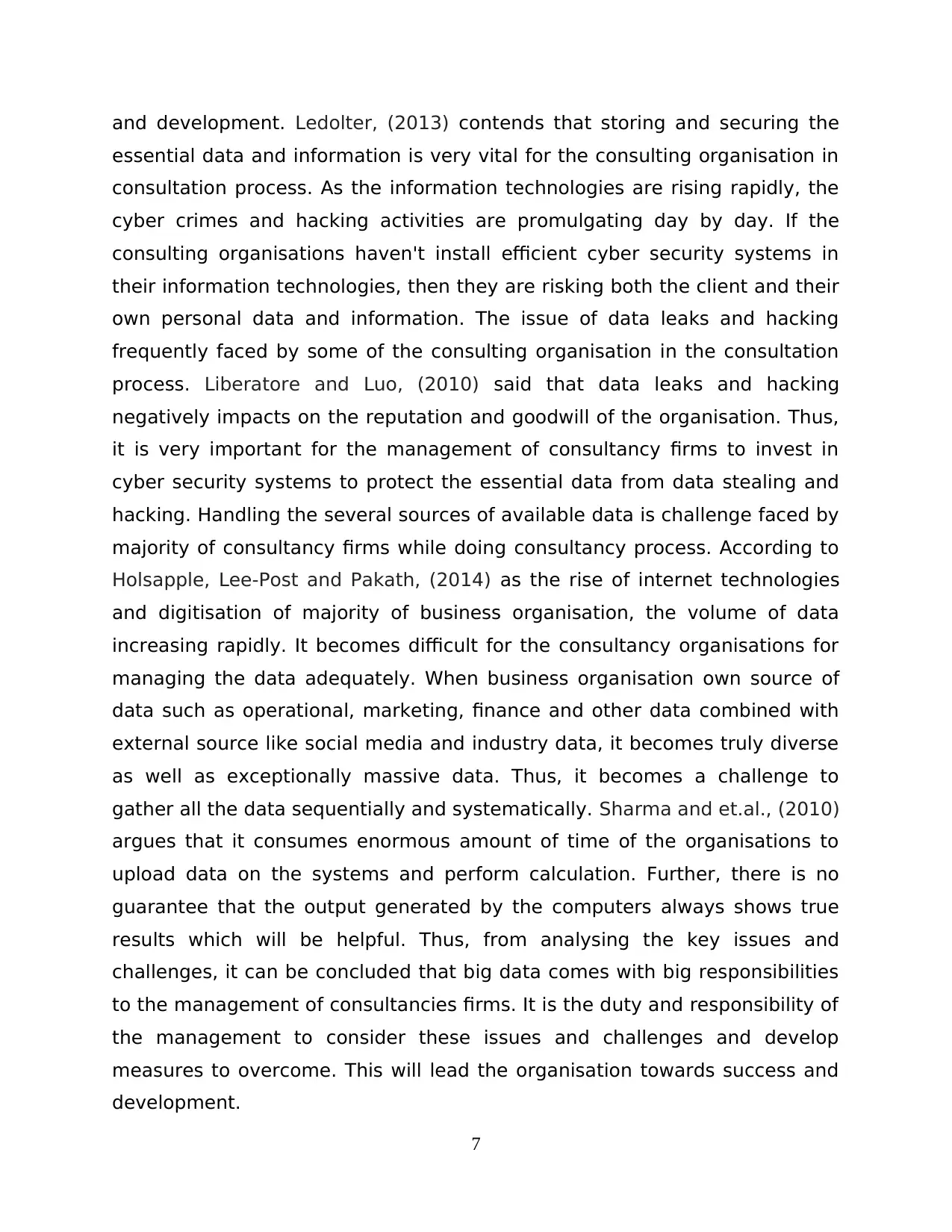
and development. Ledolter, (2013) contends that storing and securing the
essential data and information is very vital for the consulting organisation in
consultation process. As the information technologies are rising rapidly, the
cyber crimes and hacking activities are promulgating day by day. If the
consulting organisations haven't install efficient cyber security systems in
their information technologies, then they are risking both the client and their
own personal data and information. The issue of data leaks and hacking
frequently faced by some of the consulting organisation in the consultation
process. Liberatore and Luo, (2010) said that data leaks and hacking
negatively impacts on the reputation and goodwill of the organisation. Thus,
it is very important for the management of consultancy firms to invest in
cyber security systems to protect the essential data from data stealing and
hacking. Handling the several sources of available data is challenge faced by
majority of consultancy firms while doing consultancy process. According to
Holsapple, Lee-Post and Pakath, (2014) as the rise of internet technologies
and digitisation of majority of business organisation, the volume of data
increasing rapidly. It becomes difficult for the consultancy organisations for
managing the data adequately. When business organisation own source of
data such as operational, marketing, finance and other data combined with
external source like social media and industry data, it becomes truly diverse
as well as exceptionally massive data. Thus, it becomes a challenge to
gather all the data sequentially and systematically. Sharma and et.al., (2010)
argues that it consumes enormous amount of time of the organisations to
upload data on the systems and perform calculation. Further, there is no
guarantee that the output generated by the computers always shows true
results which will be helpful. Thus, from analysing the key issues and
challenges, it can be concluded that big data comes with big responsibilities
to the management of consultancies firms. It is the duty and responsibility of
the management to consider these issues and challenges and develop
measures to overcome. This will lead the organisation towards success and
development.
7
essential data and information is very vital for the consulting organisation in
consultation process. As the information technologies are rising rapidly, the
cyber crimes and hacking activities are promulgating day by day. If the
consulting organisations haven't install efficient cyber security systems in
their information technologies, then they are risking both the client and their
own personal data and information. The issue of data leaks and hacking
frequently faced by some of the consulting organisation in the consultation
process. Liberatore and Luo, (2010) said that data leaks and hacking
negatively impacts on the reputation and goodwill of the organisation. Thus,
it is very important for the management of consultancy firms to invest in
cyber security systems to protect the essential data from data stealing and
hacking. Handling the several sources of available data is challenge faced by
majority of consultancy firms while doing consultancy process. According to
Holsapple, Lee-Post and Pakath, (2014) as the rise of internet technologies
and digitisation of majority of business organisation, the volume of data
increasing rapidly. It becomes difficult for the consultancy organisations for
managing the data adequately. When business organisation own source of
data such as operational, marketing, finance and other data combined with
external source like social media and industry data, it becomes truly diverse
as well as exceptionally massive data. Thus, it becomes a challenge to
gather all the data sequentially and systematically. Sharma and et.al., (2010)
argues that it consumes enormous amount of time of the organisations to
upload data on the systems and perform calculation. Further, there is no
guarantee that the output generated by the computers always shows true
results which will be helpful. Thus, from analysing the key issues and
challenges, it can be concluded that big data comes with big responsibilities
to the management of consultancies firms. It is the duty and responsibility of
the management to consider these issues and challenges and develop
measures to overcome. This will lead the organisation towards success and
development.
7
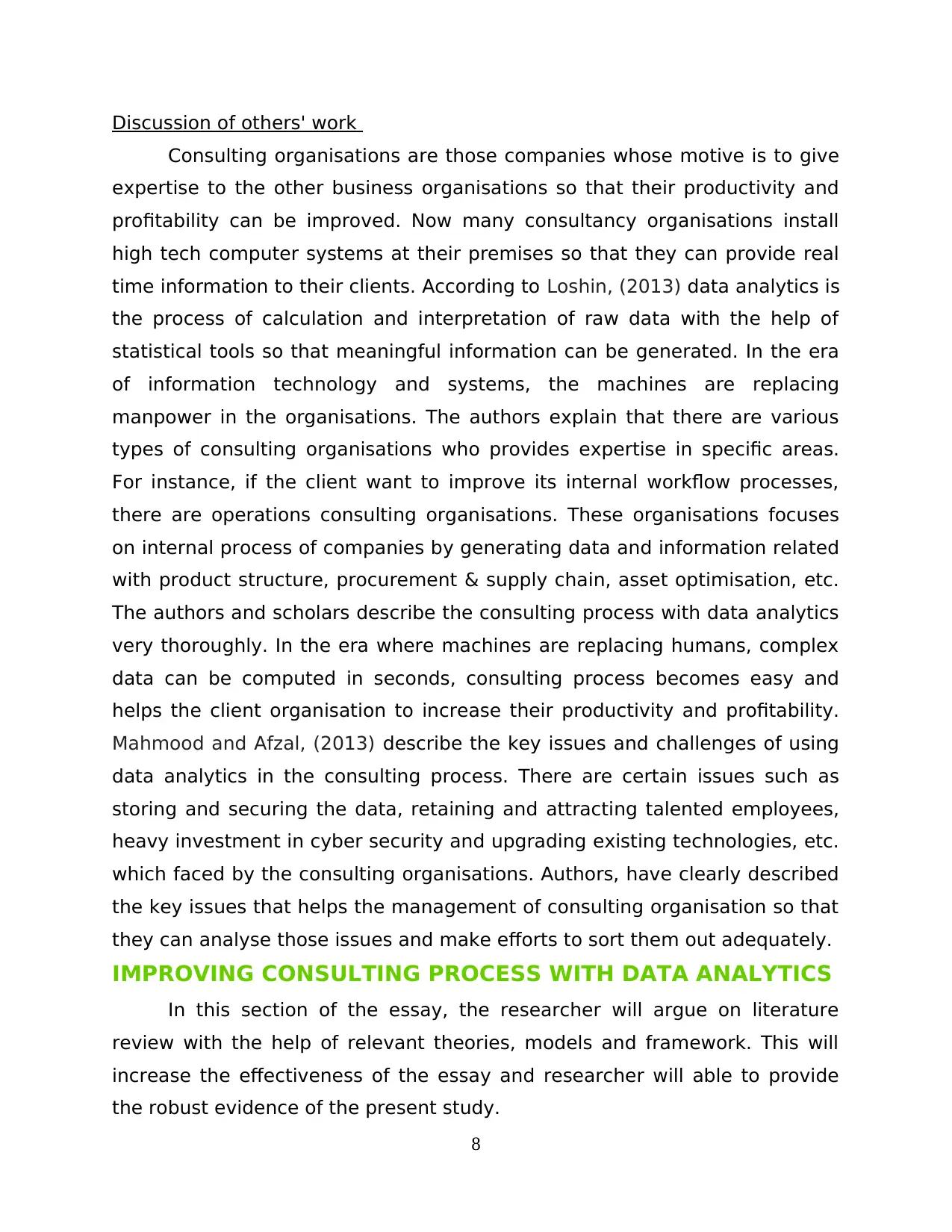
Discussion of others' work
Consulting organisations are those companies whose motive is to give
expertise to the other business organisations so that their productivity and
profitability can be improved. Now many consultancy organisations install
high tech computer systems at their premises so that they can provide real
time information to their clients. According to Loshin, (2013) data analytics is
the process of calculation and interpretation of raw data with the help of
statistical tools so that meaningful information can be generated. In the era
of information technology and systems, the machines are replacing
manpower in the organisations. The authors explain that there are various
types of consulting organisations who provides expertise in specific areas.
For instance, if the client want to improve its internal workflow processes,
there are operations consulting organisations. These organisations focuses
on internal process of companies by generating data and information related
with product structure, procurement & supply chain, asset optimisation, etc.
The authors and scholars describe the consulting process with data analytics
very thoroughly. In the era where machines are replacing humans, complex
data can be computed in seconds, consulting process becomes easy and
helps the client organisation to increase their productivity and profitability.
Mahmood and Afzal, (2013) describe the key issues and challenges of using
data analytics in the consulting process. There are certain issues such as
storing and securing the data, retaining and attracting talented employees,
heavy investment in cyber security and upgrading existing technologies, etc.
which faced by the consulting organisations. Authors, have clearly described
the key issues that helps the management of consulting organisation so that
they can analyse those issues and make efforts to sort them out adequately.
IMPROVING CONSULTING PROCESS WITH DATA ANALYTICS
In this section of the essay, the researcher will argue on literature
review with the help of relevant theories, models and framework. This will
increase the effectiveness of the essay and researcher will able to provide
the robust evidence of the present study.
8
Consulting organisations are those companies whose motive is to give
expertise to the other business organisations so that their productivity and
profitability can be improved. Now many consultancy organisations install
high tech computer systems at their premises so that they can provide real
time information to their clients. According to Loshin, (2013) data analytics is
the process of calculation and interpretation of raw data with the help of
statistical tools so that meaningful information can be generated. In the era
of information technology and systems, the machines are replacing
manpower in the organisations. The authors explain that there are various
types of consulting organisations who provides expertise in specific areas.
For instance, if the client want to improve its internal workflow processes,
there are operations consulting organisations. These organisations focuses
on internal process of companies by generating data and information related
with product structure, procurement & supply chain, asset optimisation, etc.
The authors and scholars describe the consulting process with data analytics
very thoroughly. In the era where machines are replacing humans, complex
data can be computed in seconds, consulting process becomes easy and
helps the client organisation to increase their productivity and profitability.
Mahmood and Afzal, (2013) describe the key issues and challenges of using
data analytics in the consulting process. There are certain issues such as
storing and securing the data, retaining and attracting talented employees,
heavy investment in cyber security and upgrading existing technologies, etc.
which faced by the consulting organisations. Authors, have clearly described
the key issues that helps the management of consulting organisation so that
they can analyse those issues and make efforts to sort them out adequately.
IMPROVING CONSULTING PROCESS WITH DATA ANALYTICS
In this section of the essay, the researcher will argue on literature
review with the help of relevant theories, models and framework. This will
increase the effectiveness of the essay and researcher will able to provide
the robust evidence of the present study.
8
⊘ This is a preview!⊘
Do you want full access?
Subscribe today to unlock all pages.

Trusted by 1+ million students worldwide
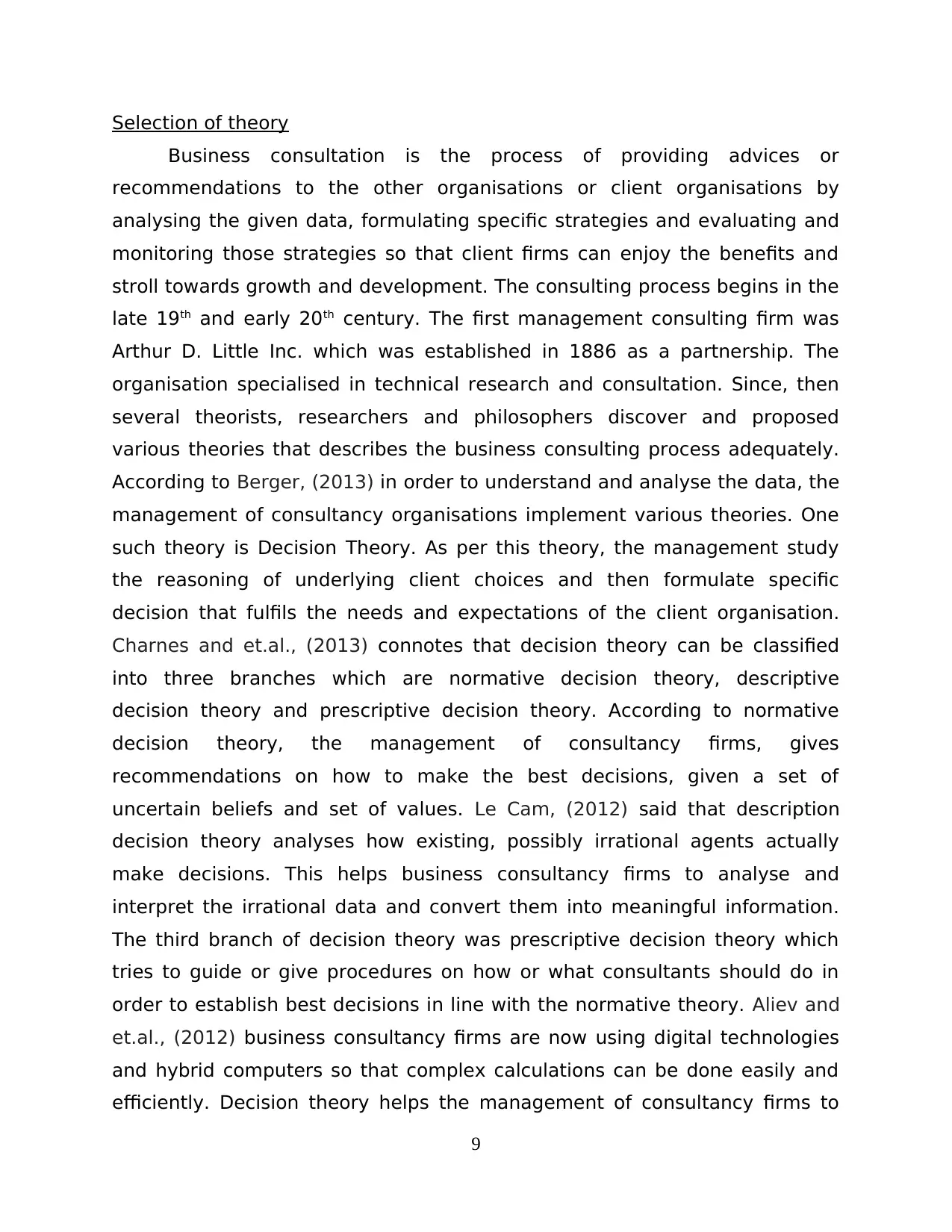
Selection of theory
Business consultation is the process of providing advices or
recommendations to the other organisations or client organisations by
analysing the given data, formulating specific strategies and evaluating and
monitoring those strategies so that client firms can enjoy the benefits and
stroll towards growth and development. The consulting process begins in the
late 19th and early 20th century. The first management consulting firm was
Arthur D. Little Inc. which was established in 1886 as a partnership. The
organisation specialised in technical research and consultation. Since, then
several theorists, researchers and philosophers discover and proposed
various theories that describes the business consulting process adequately.
According to Berger, (2013) in order to understand and analyse the data, the
management of consultancy organisations implement various theories. One
such theory is Decision Theory. As per this theory, the management study
the reasoning of underlying client choices and then formulate specific
decision that fulfils the needs and expectations of the client organisation.
Charnes and et.al., (2013) connotes that decision theory can be classified
into three branches which are normative decision theory, descriptive
decision theory and prescriptive decision theory. According to normative
decision theory, the management of consultancy firms, gives
recommendations on how to make the best decisions, given a set of
uncertain beliefs and set of values. Le Cam, (2012) said that description
decision theory analyses how existing, possibly irrational agents actually
make decisions. This helps business consultancy firms to analyse and
interpret the irrational data and convert them into meaningful information.
The third branch of decision theory was prescriptive decision theory which
tries to guide or give procedures on how or what consultants should do in
order to establish best decisions in line with the normative theory. Aliev and
et.al., (2012) business consultancy firms are now using digital technologies
and hybrid computers so that complex calculations can be done easily and
efficiently. Decision theory helps the management of consultancy firms to
9
Business consultation is the process of providing advices or
recommendations to the other organisations or client organisations by
analysing the given data, formulating specific strategies and evaluating and
monitoring those strategies so that client firms can enjoy the benefits and
stroll towards growth and development. The consulting process begins in the
late 19th and early 20th century. The first management consulting firm was
Arthur D. Little Inc. which was established in 1886 as a partnership. The
organisation specialised in technical research and consultation. Since, then
several theorists, researchers and philosophers discover and proposed
various theories that describes the business consulting process adequately.
According to Berger, (2013) in order to understand and analyse the data, the
management of consultancy organisations implement various theories. One
such theory is Decision Theory. As per this theory, the management study
the reasoning of underlying client choices and then formulate specific
decision that fulfils the needs and expectations of the client organisation.
Charnes and et.al., (2013) connotes that decision theory can be classified
into three branches which are normative decision theory, descriptive
decision theory and prescriptive decision theory. According to normative
decision theory, the management of consultancy firms, gives
recommendations on how to make the best decisions, given a set of
uncertain beliefs and set of values. Le Cam, (2012) said that description
decision theory analyses how existing, possibly irrational agents actually
make decisions. This helps business consultancy firms to analyse and
interpret the irrational data and convert them into meaningful information.
The third branch of decision theory was prescriptive decision theory which
tries to guide or give procedures on how or what consultants should do in
order to establish best decisions in line with the normative theory. Aliev and
et.al., (2012) business consultancy firms are now using digital technologies
and hybrid computers so that complex calculations can be done easily and
efficiently. Decision theory helps the management of consultancy firms to
9
Paraphrase This Document
Need a fresh take? Get an instant paraphrase of this document with our AI Paraphraser
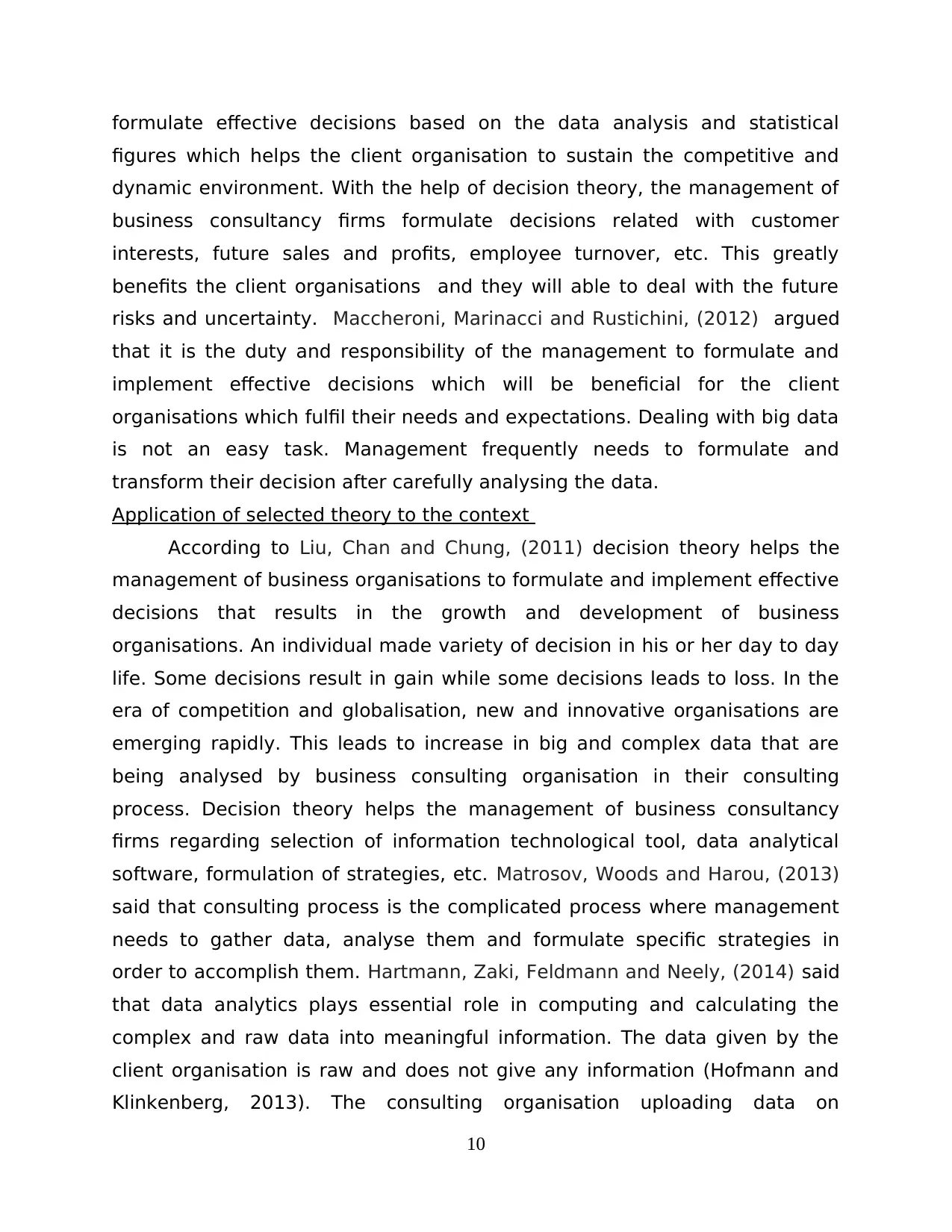
formulate effective decisions based on the data analysis and statistical
figures which helps the client organisation to sustain the competitive and
dynamic environment. With the help of decision theory, the management of
business consultancy firms formulate decisions related with customer
interests, future sales and profits, employee turnover, etc. This greatly
benefits the client organisations and they will able to deal with the future
risks and uncertainty. Maccheroni, Marinacci and Rustichini, (2012) argued
that it is the duty and responsibility of the management to formulate and
implement effective decisions which will be beneficial for the client
organisations which fulfil their needs and expectations. Dealing with big data
is not an easy task. Management frequently needs to formulate and
transform their decision after carefully analysing the data.
Application of selected theory to the context
According to Liu, Chan and Chung, (2011) decision theory helps the
management of business organisations to formulate and implement effective
decisions that results in the growth and development of business
organisations. An individual made variety of decision in his or her day to day
life. Some decisions result in gain while some decisions leads to loss. In the
era of competition and globalisation, new and innovative organisations are
emerging rapidly. This leads to increase in big and complex data that are
being analysed by business consulting organisation in their consulting
process. Decision theory helps the management of business consultancy
firms regarding selection of information technological tool, data analytical
software, formulation of strategies, etc. Matrosov, Woods and Harou, (2013)
said that consulting process is the complicated process where management
needs to gather data, analyse them and formulate specific strategies in
order to accomplish them. Hartmann, Zaki, Feldmann and Neely, (2014) said
that data analytics plays essential role in computing and calculating the
complex and raw data into meaningful information. The data given by the
client organisation is raw and does not give any information (Hofmann and
Klinkenberg, 2013). The consulting organisation uploading data on
10
figures which helps the client organisation to sustain the competitive and
dynamic environment. With the help of decision theory, the management of
business consultancy firms formulate decisions related with customer
interests, future sales and profits, employee turnover, etc. This greatly
benefits the client organisations and they will able to deal with the future
risks and uncertainty. Maccheroni, Marinacci and Rustichini, (2012) argued
that it is the duty and responsibility of the management to formulate and
implement effective decisions which will be beneficial for the client
organisations which fulfil their needs and expectations. Dealing with big data
is not an easy task. Management frequently needs to formulate and
transform their decision after carefully analysing the data.
Application of selected theory to the context
According to Liu, Chan and Chung, (2011) decision theory helps the
management of business organisations to formulate and implement effective
decisions that results in the growth and development of business
organisations. An individual made variety of decision in his or her day to day
life. Some decisions result in gain while some decisions leads to loss. In the
era of competition and globalisation, new and innovative organisations are
emerging rapidly. This leads to increase in big and complex data that are
being analysed by business consulting organisation in their consulting
process. Decision theory helps the management of business consultancy
firms regarding selection of information technological tool, data analytical
software, formulation of strategies, etc. Matrosov, Woods and Harou, (2013)
said that consulting process is the complicated process where management
needs to gather data, analyse them and formulate specific strategies in
order to accomplish them. Hartmann, Zaki, Feldmann and Neely, (2014) said
that data analytics plays essential role in computing and calculating the
complex and raw data into meaningful information. The data given by the
client organisation is raw and does not give any information (Hofmann and
Klinkenberg, 2013). The consulting organisation uploading data on
10
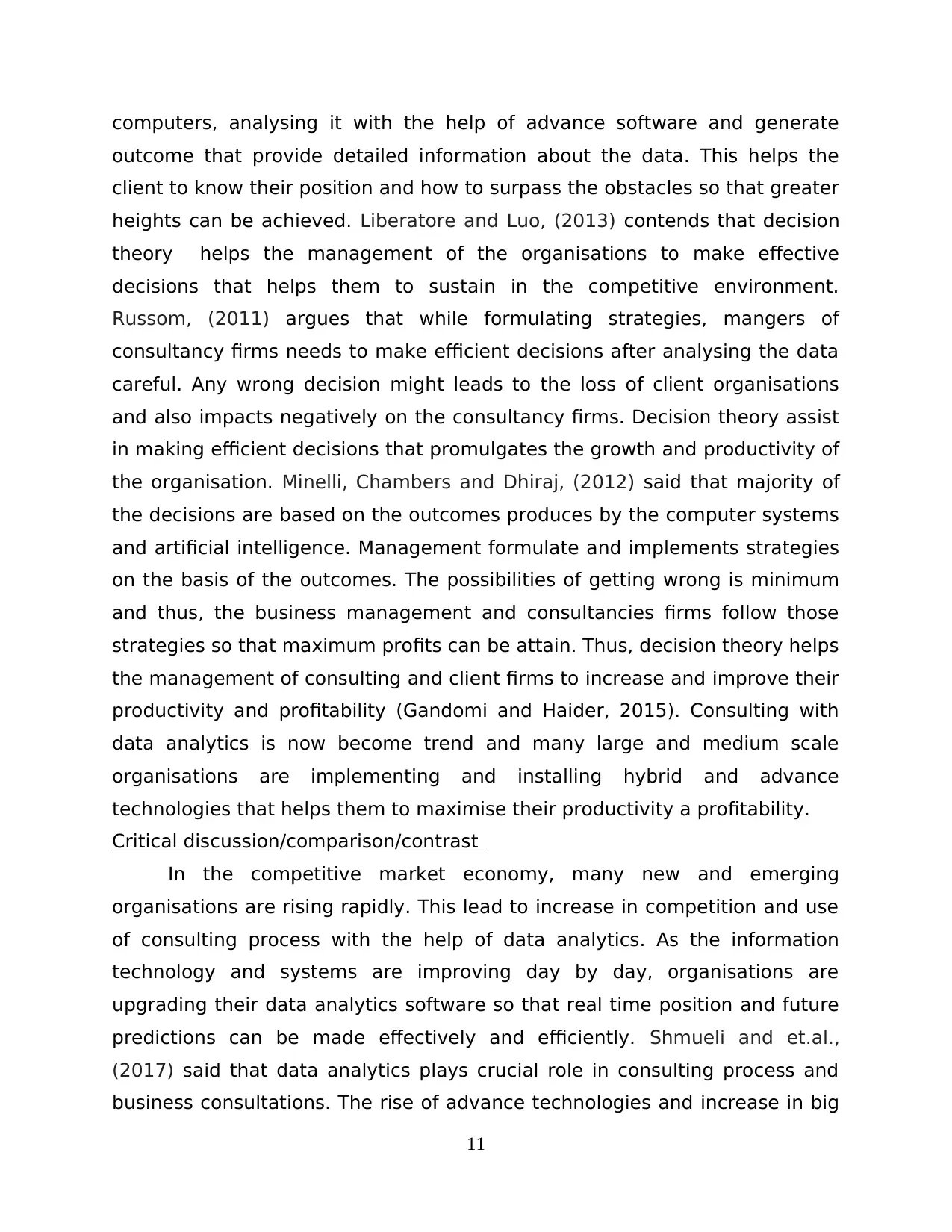
computers, analysing it with the help of advance software and generate
outcome that provide detailed information about the data. This helps the
client to know their position and how to surpass the obstacles so that greater
heights can be achieved. Liberatore and Luo, (2013) contends that decision
theory helps the management of the organisations to make effective
decisions that helps them to sustain in the competitive environment.
Russom, (2011) argues that while formulating strategies, mangers of
consultancy firms needs to make efficient decisions after analysing the data
careful. Any wrong decision might leads to the loss of client organisations
and also impacts negatively on the consultancy firms. Decision theory assist
in making efficient decisions that promulgates the growth and productivity of
the organisation. Minelli, Chambers and Dhiraj, (2012) said that majority of
the decisions are based on the outcomes produces by the computer systems
and artificial intelligence. Management formulate and implements strategies
on the basis of the outcomes. The possibilities of getting wrong is minimum
and thus, the business management and consultancies firms follow those
strategies so that maximum profits can be attain. Thus, decision theory helps
the management of consulting and client firms to increase and improve their
productivity and profitability (Gandomi and Haider, 2015). Consulting with
data analytics is now become trend and many large and medium scale
organisations are implementing and installing hybrid and advance
technologies that helps them to maximise their productivity a profitability.
Critical discussion/comparison/contrast
In the competitive market economy, many new and emerging
organisations are rising rapidly. This lead to increase in competition and use
of consulting process with the help of data analytics. As the information
technology and systems are improving day by day, organisations are
upgrading their data analytics software so that real time position and future
predictions can be made effectively and efficiently. Shmueli and et.al.,
(2017) said that data analytics plays crucial role in consulting process and
business consultations. The rise of advance technologies and increase in big
11
outcome that provide detailed information about the data. This helps the
client to know their position and how to surpass the obstacles so that greater
heights can be achieved. Liberatore and Luo, (2013) contends that decision
theory helps the management of the organisations to make effective
decisions that helps them to sustain in the competitive environment.
Russom, (2011) argues that while formulating strategies, mangers of
consultancy firms needs to make efficient decisions after analysing the data
careful. Any wrong decision might leads to the loss of client organisations
and also impacts negatively on the consultancy firms. Decision theory assist
in making efficient decisions that promulgates the growth and productivity of
the organisation. Minelli, Chambers and Dhiraj, (2012) said that majority of
the decisions are based on the outcomes produces by the computer systems
and artificial intelligence. Management formulate and implements strategies
on the basis of the outcomes. The possibilities of getting wrong is minimum
and thus, the business management and consultancies firms follow those
strategies so that maximum profits can be attain. Thus, decision theory helps
the management of consulting and client firms to increase and improve their
productivity and profitability (Gandomi and Haider, 2015). Consulting with
data analytics is now become trend and many large and medium scale
organisations are implementing and installing hybrid and advance
technologies that helps them to maximise their productivity a profitability.
Critical discussion/comparison/contrast
In the competitive market economy, many new and emerging
organisations are rising rapidly. This lead to increase in competition and use
of consulting process with the help of data analytics. As the information
technology and systems are improving day by day, organisations are
upgrading their data analytics software so that real time position and future
predictions can be made effectively and efficiently. Shmueli and et.al.,
(2017) said that data analytics plays crucial role in consulting process and
business consultations. The rise of advance technologies and increase in big
11
⊘ This is a preview!⊘
Do you want full access?
Subscribe today to unlock all pages.

Trusted by 1+ million students worldwide
1 out of 18
Related Documents
Your All-in-One AI-Powered Toolkit for Academic Success.
+13062052269
info@desklib.com
Available 24*7 on WhatsApp / Email
![[object Object]](/_next/static/media/star-bottom.7253800d.svg)
Unlock your academic potential
Copyright © 2020–2026 A2Z Services. All Rights Reserved. Developed and managed by ZUCOL.




